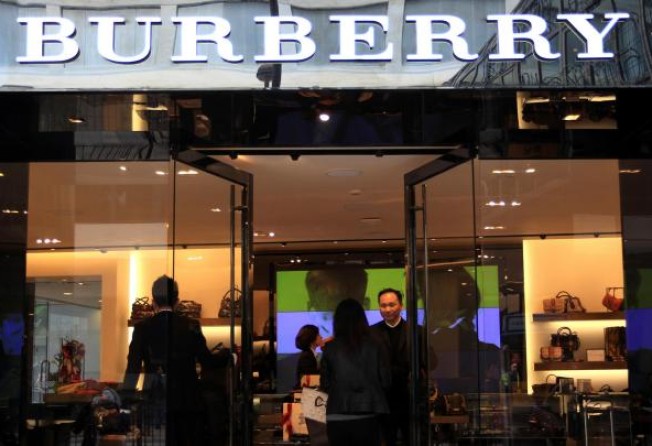
Luxury brands report slower sales as buyers reach their limit
Wealthy shoppers appear to have reached their limits as purveyors of luxury brands report that their sales are beginning to slow

Burberry Group's flagging sales growth suggests an end to a three-year rally in the luxury-goods industry as wealthy shoppers cut back on past indulgences.

Burberry, Britain's largest luxury-goods company, said September 11 that full-year profit will disappoint investors after same-store revenue stalled in the last 10 weeks, sending the shares down the most ever and erasing £1.27 billion (HK$15.78 billion) in market value.
Richemont, Prada, LVMH and Gucci-owner PPR also tumbled on concern that the slowdown may not be confined to London-based Burberry as shoppers in China and South Korea become more timid about splashing out.
"Asia is carrying the luxury industry today, so any change in the pace of evolution there is going to affect the entire industry," said Uchi Okonkwo, executive director of Paris-based consultancy Luxe Corp. The region is "not as easy to crack as it used to be so brands need to adjust".
Luxury companies rebounded after the 2008 collapse of Lehman Brothers, enjoying a surge in demand for US$4,100 green python shoulder bags and Rolex watches among the world's wealthiest shoppers.
"We know we are not alone in terms of what we've seen in the last couple of weeks," Burberry chief financial officer Stacey Cartwright said, citing conversations with other luxury-goods makers.
Burberry's adjusted net income has grown by more than 10 per cent each year since 2009, according to Bloomberg data.
Burberry fell 21 per cent to 1,088 pence in London on September 11, the steepest drop since the company's 2002 initial public offering.
In China, where a boom in demand for watches and jewellery has spurred sales gains for some luxury companies, the economy grew at the slowest pace in three years in the second quarter. Europe's debt crisis is dampening the economic outlook and banks in the region have laid off 172,000 people since 2009, while the US unemployment rate has been above 8 per cent since February 2009, the longest stretch in monthly records dating to 1948.
That is starting to have an effect on global travel and the number of people shopping at luxury stores, said Kate Calvert, an analyst at Seymour Pierce. The global luxury goods market this year may expand more than 7 per cent to over US$302 billion, Euromonitor International said on Tuesday. Bain Capital estimated in May that the industry grew 13 per cent last year, excluding currency moves.
Tiffany & Co, the world's second-largest luxury jewellery retailer, reduced its full-year profit forecast on August 27 amid weaker sales growth.
Harry Winston, a Canadian diamond-mining company and jewellery retailer, said last week that demand for luxury products has slowed because of economic instability in Europe and lower growth in export-driven emerging markets.
"If you have companies like Burberry, Tiffany and Harry Winston talking about a slowdown, then it's not company specific," said Patrik Schwendimann, head of consumer-goods research at Zuercher Kantonalbank. The slowdown at Burberry has been "broad-based in all of the regions", Cartwright said.
Burberry got 37 per cent of sales from the Asia-Pacific region last year, according to Bloomberg data. Europe accounted for 32 per cent and the Americas generated 25 per cent. Adjusted pretax profit for the year to March 31 will be at the lower end of analyst estimates ranging from £407 million to £454 million, she said.
Some of the weakness in Burberry's sales may have been "self-inflicted", according to Guy, who cited the company's attempts to move upscale by cutting some opening-price-point products, particularly in the US.
Burberry said it is "taking appropriate actions to protect short-term profitability", including clamping down on expenses in areas such as hiring and travel.
Luxury-goods makers with relatively high fixed-cost bases and low operating expenses as a percentage of sales have less room for manoeuvre if demand softens, Guy said.
Richemont's operating expenses as a percentage of sales is about 41 per cent, compared with an industry average of about 45 per cent, according to the analyst. Prada has a ratio of about 35 per cent, compared with Burberry's 52 per cent, he said.